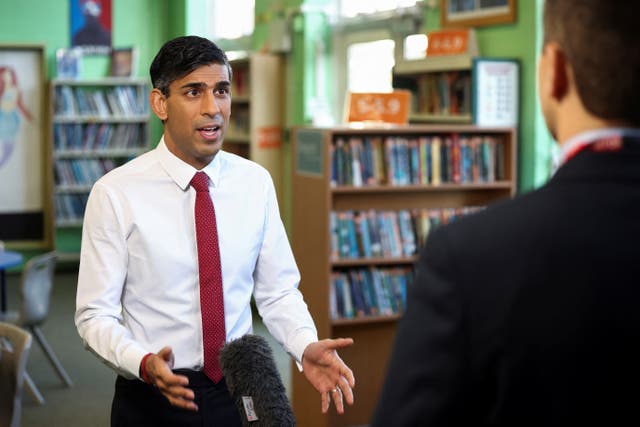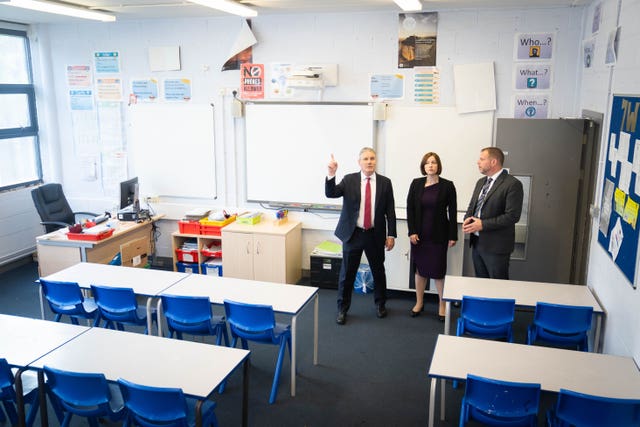The Building Schools for the Future (BSF) programme was axed in 2010 in response to concerns over its cost and scope.
The state of England’s schools is in the spotlight after more than 100 were ordered to fully or partially shut just days before the start of term due to concerns about the safety of reinforced autoclaved aerated concrete (Raac).
A BBC investigation found at least 13 schools now confirmed to have Raac were included in the £55 billion BSF, a project to renew every secondary school in England, rebuilding half of them and refurbishing the rest, which was axed by then-education secretary Michael Gove.
The general secretary of the Association of School and College Leaders (ASCL) union Geoff Barton said: “I think the nation’s parents will think this just reinforces a sense that we have got a Government that frankly doesn’t care, and hasn’t cared about education for many years.”
He told BBC Radio 4’s Today that there were “all kinds of flaws” with the BSF programme, “but it was saying something important, that the nation’s schools needed to be refurbished”.
“What we have got today, therefore, is some of those schools’ headteachers scrambling around trying to identify bits of concrete which might look like Aero bars when they should be focusing on children learning and developing.”
Daniel Kebede, general secretary for the National Education Union, claimed there would not be any Raac in a single secondary school in England if the programme had continued.
We are putting extensive help in place to provide rapid support for schools and colleges affected by RAAC, to minimise any disruption to learning.
For more information:https://t.co/HZtETclz5O pic.twitter.com/YkUymbtakA
— Department for Education (@educationgovuk) September 5, 2023
“It has in my opinion been calculated neglect,” he said.
But Cabinet minister Grant Shapps defended the Tories’ record on school building.
“There was a big increase, actually a quarter increase in the 2021 budget on these capital projects for schools,” he told the BBC.
“We’ve done about 500 over the last 10 years, the project has to do another 500.
The utter complacency.
The Education Secretary needs to get a grip, own up to the scale of the problem, and publish the list of all schools with dangerous crumbly concrete now. https://t.co/CmLRmhTc28
— Bridget Phillipson (@bphillipsonMP) September 5, 2023
“That Building Schools for the Future programme… only referred to secondary schools, and secondary schools are the minority of schools.”
On Times Radio he said: “We didn’t think it (BSF) was the right programme to take forward, but many of those schools have had other remedial work or building work done in the meantime.
“So I don’t think just sticking to what happened to be a previous policy is the answer to what would have still been a problem today.”
Rishi Sunak will face Sir Keir Starmer at Prime Minister’s Questions for the first time in seven weeks in a session likely to be dominated by the Raac crisis.
The Prime Minister’s actions as chancellor have already been questioned after one of his ministers suggested Mr Sunak approved funding for 50 schools a year to be rebuilt, rejecting an application for cash for 200 a year.

Sir Keir said: “He took a decision in 2021. I think the least that we’re entitled to is to know what risks were pointed out to him in 2021 when the Prime Minister took those decisions, and an answer from him as to why he didn’t allow that funding to go forward.”
He told BBC Breakfast that Labour would ensure schools are both “open and safe”, but did not provide the details of what any rebuilding or refurbishing programme would look like under his party.
“Obviously, as we did when we were last in government, we will have a programme for schools. We’ll set out what that future programme is as we get towards the election,” he said.
“We would give an assurance that the necessary work would be done.”

Labour will also try to use an arcane parliamentary mechanism to discover what the Prime Minister knew about the crisis during his tenure in the Treasury.
The Prime Minister has rejected the attack on his Treasury record.
Elsewhere, shadow education secretary Bridget Phillipson said under-fire Education Secretary Gillian Keegan has “serious questions to answer” after it emerged a company the senior Tory’s husband has links to was handed a £1 million IT contract from a fund earmarked for rebuilding schools.

As reported by the Daily Mirror, which broke the news about the contract, Michael Keegan states on his LinkedIn social media page that he is a non-executive director at technology firm Centerprise.
The company was one of six suppliers awarded contracts earlier this year to replace server infrastructure, with the money coming from the DfE’s school rebuilding programme fund.
Ms Phillipson said: “This appears to be a gross conflict of interest and eyebrows will be raised that the Keegans appear to have gained from a shrinking pot of school rebuilding money.”
There is no suggestion of any wrongdoing by Mr and Mrs Keegan.
A DfE spokeswoman said: “Ministers had no involvement in the procurement process for these contracts, which were awarded in line with existing Government commercial procedures.”
Credit: Source link




